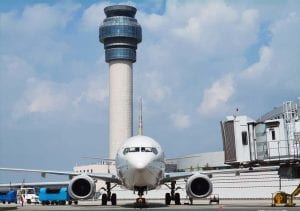Every traveler pays a 7.5 percent transportation excise tax. It is a tax paid by travelers, not the airlines. There is no tax on checked baggage.

The transportation excise tax makes sure that the Department of Transportation (DOT) gets funding to run the transportation system. Some call it a double tax. First, passengers pay a hefty 7.5 percent tax on the airfare. Plus, the airlines pay taxes on the profits they make from the flight. This tax is hidden from the American public within the airfare. Just like the segment fees or international head taxes, it is not broken out in most airline advertising.
The excise tax is used to pay for the air traffic control system and a portion is put in the aviation fund for future projects. Currently, this fund has excess funds. However, they are being saved for a rainy day.
The full-fare advertising act was established to allow passengers to know the full cost of travel.
In 2011, the full-fare advertising rule was created to require airlines to make all advertising truthful. That rule states that advertised airfares must include all mandatory taxes and fees. The rule goes on to state that the total cost of travel must be printed in larger type than the taxes and fees. However, the taxes and fees can be broken out in advertising should the airlines choose. The airlines went to court because they felt that having a tax tacked onto the advertised price was misleading. Airlines claimed that this total cost reduced the number of Americans willing to travel.
The excise tax has come to the forefront because of the unbundling of airfares that airlines have engaged in since 2008. As they separated baggage charges, seat reservation fees, and other fees from the airfare, the airlines asked the IRS what pieces of the once-unified airfare were subject to the transportation excise tax.
DOT said all taxes and mandatory fees must be included in the advertised cost of the airline ticket.

DOT and the IRS divided baby by saying that the airfare would be subject to 7.5 percent excise tax. All mandatory fees would not be subject to the excise tax. Plus, all optional fees such as seat reservations fees, checked baggage fees, and telephone assistance were exempt from the excise tax.
The IRS imposes taxes on the travel of humans. However, not on the transport of luggage.
Here is the first portion of the relevant IRS regulation:
Sec. 4261. Imposition of tax
(a) In general
There is hereby imposed on the amount paid for taxable transportation of any person a tax equal to 7.5 percent of the amount so paid.
Here is the response from the IRS:
Section 49.4261-8 provides examples of payments for services not subject to the § 4261(a) tax. As relevant herein, § 49.4261-8(f)(1) provides that the § 4261 tax does not apply to charges for transportation of baggage, including incidental charges such as excess value, storage, transfer, parcel checking, special delivery, etc.
The full-fare advertising rule was challenged by several airlines
Southwest, Spirit, and Frontier Airlines took the case as far as the US Supreme Court, claiming that DOT has overstepped its authority. The District Courts found in favor of the DOT. The Supreme Court refused to hear the case, allowing the DOT rule to remain in place. That means that the airfare costs together with mandatory taxes and fees — passenger facility charge of $4.50, segment tax of $4.30, 7.5 percent transportation tax, and $5.60 U.S. security fee — will still be required.
Plus, even with the strong airline objections to the appearance of an increase in airfares, no airlines regularly separated taxes from advertising. However, the airlines claim that their business is one of the most heavily taxed in the United States.
Here’s the aviation transportation excise tax bottom line: Travelers pay the tax when they purchase airfare.
The current IRS rule costs every traveler 7.5 percent. Because it does not apply to baggage, it saves passengers the 7.5 percent tax that would be imposed on baggage fees bundled into the airfare. Without the current IRS ruling, passengers would be paying an extra 7.5 percent for every piece of checked baggage. Airlines are not getting away with anything.
READ ALSO:
Know the full-fare advertising rule for airlines to save money
Know the real rules for compensation when you are bumped

Charlie Leocha is the President of Travelers United. He has been working in Washington, DC, for the past 14 years with Congress, the Department of Transportation, and industry stakeholders on travel issues. He was the first consumer representative to the Advisory Committee for Aviation Consumer Protections appointed by the Secretary of Transportation from 2012 through 2018.


